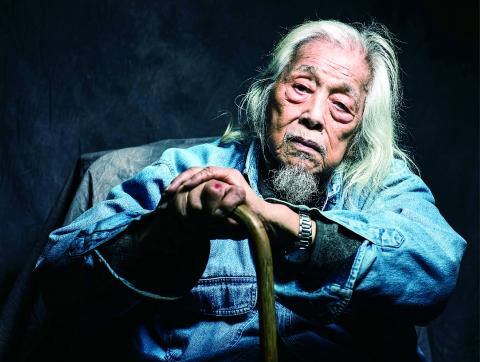Taiwanese yesterday offered messages of condolence after Taiwanese independence advocate Su Beng (史明) died late on Friday at the age of 100.
Doctors said he died from multiple organ failure.
Su Beng Education Foundation chairwoman Huang Min-hung (黃敏紅) thanked people who offered their condolences on Facebook.

Photo provided by Avanguard Publishing
“Su lived a long and fulfilling life, he does not owe Taiwan anything. Now it is up to Taiwan to determine its own path,” Huang told a news conference in Taipei.
Su’s last words were that “Taiwan must win, and to do so, [President] Tsai Ing-wen (蔡英文) must win a second term,” Huang said.
Su had no children or wealth, having dedicated his life and fortune to the independence movement, Huang said, adding that the foundation would find a suitable location for a memorial.
Many people left messages on Su’s Facebook page, thanking him for his efforts to promote democracy and independence.
Tsai late on Friday wrote on Facebook that she had just visited Su two days earlier, and that while his condition was critical, she had not expected him to pass away so soon.
They had Lunar New Year’s Eve dinner together every year, Tsai said, adding that she would leave a chair for him at next year’s dinner table to commemorate his life of dedication.
Premier Su Tseng-chang (蘇貞昌) yesterday said that Su Beng had dedicated his life to Taiwan, not only writing about its history, but also forgoing personal pleasures and dedicating his time to bringing about Taiwanese autonomy.
“We must cherish his memory and legacy, and guard it well, so that our progeny can be independent,” the premier said.
The Democratic Progressive Party tipped its hat to Su Beng for his efforts and said in a statement that it would continue efforts to reinforce the concept of Taiwanese sovereignty based on its Resolution on Taiwan’s Future.
Su Beng was born to a wealthy family in Taipei’s Shilin District (士林) on Nov. 9, 1918.
He left Taiwan to study at Waseda University in Japan, where he seemed to adopt Marxism. After graduating in 1942, he went to China, where he worked undercover as part of the Chinese Communist Party’s (CCP) anti-Japanese efforts.
He returned to Taiwan in 1949 because he was discontented with the CCP’s actions, and since then pushed for Taiwanese independence.
In 1952, he was a fugitive from the Chinese Nationalist Party (KMT) under Chiang Kai-shek (蔣介石) because of a plot to assassinate Chiang.
He stowed away on a boat to Japan, which gave him political asylum, and from 1952 to 1993 he operated a noodle shop in Tokyo, the proceeds of which he used to promote Taiwanese independence.
While there, he also began writing Taiwan’s 400-Year History (台灣人四百年史).
Named Shih Chao-hui (施朝暉) at birth, he changed his name to Su Beng — which means “historically clear” in Hoklo (commonly known as Taiwanese) — to underline the importance of having a clear understanding of history.
Su Beng returned to Taiwan in 1993 after martial law ended and his status as a political dissident was lifted.

The US government has signed defense cooperation agreements with Japan and the Philippines to boost the deterrence capabilities of countries in the first island chain, a report by the National Security Bureau (NSB) showed. The main countries on the first island chain include the two nations and Taiwan. The bureau is to present the report at a meeting of the legislature’s Foreign Affairs and National Defense Committee tomorrow. The US military has deployed Typhon missile systems to Japan’s Yamaguchi Prefecture and Zambales province in the Philippines during their joint military exercises. It has also installed NMESIS anti-ship systems in Japan’s Okinawa

‘WIN-WIN’: The Philippines, and central and eastern European countries are important potential drone cooperation partners, Minister of Foreign Affairs Lin Chia-lung said Minister of Foreign Affairs Lin Chia-lung (林佳龍) in an interview published yesterday confirmed that there are joint ventures between Taiwan and Poland in the drone industry. Lin made the remark in an exclusive interview with the Chinese-language Liberty Times (the Taipei Times’ sister paper). The government-backed Taiwan Excellence Drone International Business Opportunities Alliance and the Polish Chamber of Unmanned Systems on Wednesday last week signed a memorandum of understanding in Poland to develop a “non-China” supply chain for drones and work together on key technologies. Asked if Taiwan prioritized Poland among central and eastern European countries in drone collaboration, Lin

NO CONFIDENCE MOTION? The premier said that being toppled by the legislature for defending the Constitution would be a democratic badge of honor for him Premier Cho Jung-tai (卓榮泰) yesterday announced that the Cabinet would not countersign the amendments to the local revenue-sharing law passed by the Legislative Yuan last month. Cho said the decision not to countersign the amendments to the Act Governing the Allocation of Government Revenues and Expenditures (財政收支劃分法) was made in accordance with the Constitution. “The decision aims to safeguard our Constitution,” he said. The Constitution stipulates the president shall, in accordance with law, promulgate laws and issue mandates with the countersignature of the head of the Executive Yuan, or with the countersignatures of both the head of the Executive Yuan and ministers or

CABINET APPROVAL: People seeking assisted reproduction must be assessed to determine whether they would be adequate parents, the planned changes say Proposed amendments to the Assisted Reproduction Act (人工生殖法) advanced yesterday by the Executive Yuan would grant married lesbian couples and single women access to legal assisted reproductive services. The proposed revisions are “based on the fundamental principle of respecting women’s reproductive autonomy,” Cabinet spokesperson Michelle Lee (李慧芝) quoted Vice Premier Cheng Li-chiun (鄭麗君), who presided over a Cabinet meeting earlier yesterday, as saying at the briefing. The draft amendment would be submitted to the legislature for review. The Ministry of Health and Welfare, which proposed the amendments, said that experts on children’s rights, gender equality, law and medicine attended cross-disciplinary meetings, adding that